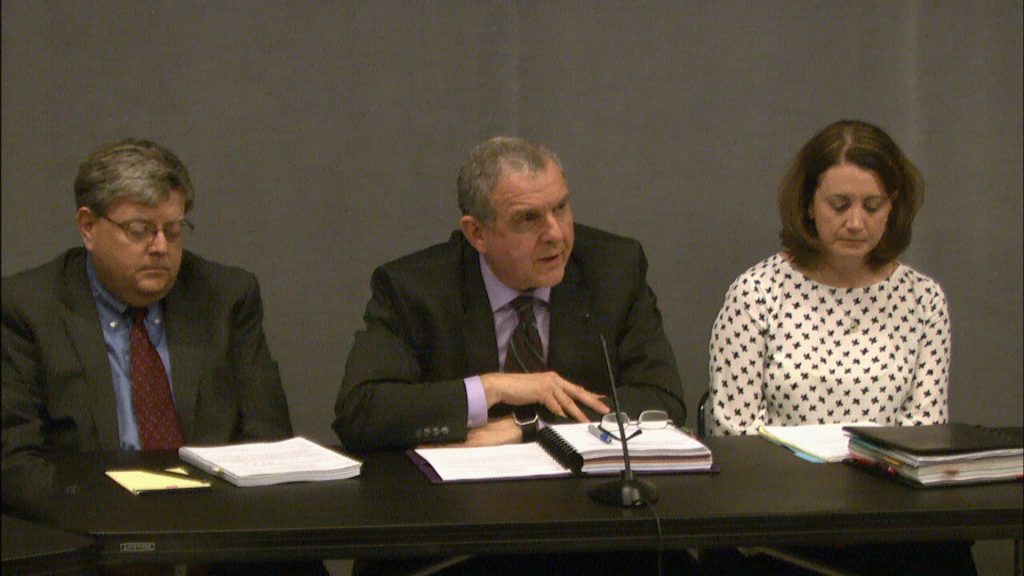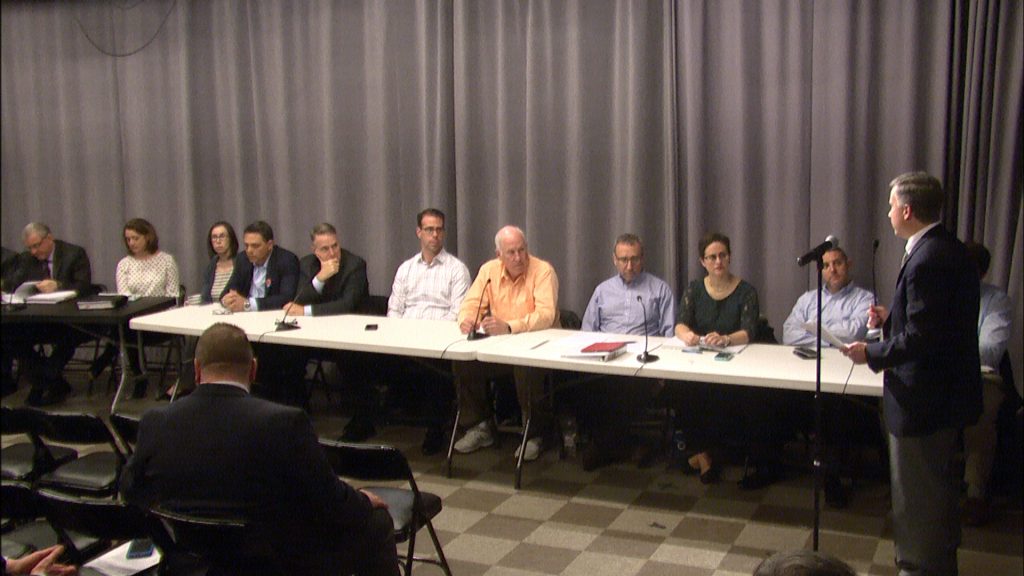 Reading, MA — The Finance Committee hosted a Financial Forum on March 28 for the purpose of answering any final questions from residents about the April 3 Proposition 2 1/2 override ballot question. The forum was attended by the Board of Selectmen, School Committee, and several municipal government and school department staff members. Most questions had been submitted in advance, though questions from residents in attendance were encouraged. Questions ranged from the differences between overrides and debt exclusions, need for additional public safety personnel, use of free cash reserves, fee increases, and whether or not enough cuts to the budget had already been made.
Reading, MA — The Finance Committee hosted a Financial Forum on March 28 for the purpose of answering any final questions from residents about the April 3 Proposition 2 1/2 override ballot question. The forum was attended by the Board of Selectmen, School Committee, and several municipal government and school department staff members. Most questions had been submitted in advance, though questions from residents in attendance were encouraged. Questions ranged from the differences between overrides and debt exclusions, need for additional public safety personnel, use of free cash reserves, fee increases, and whether or not enough cuts to the budget had already been made.

The session began with resident Bill Brown advocating that the override question is illegal, due to its specificity. Brown argued that Town Meeting cannot tell the school department how to spend any additional funds, therefore stating what the funds will be used for on the ballot question is incorrect. Town Manager Robert LeLacheur assured the assembled crowd that town counsel had reviewed the question language and that it was consistent with what is allowed under state law.

LeLacheur also answered regarding the difference between overrides and debt excursions. He explained that debt exclusions, such as those used to build the library and the high school, are for one-time capital expenditures and eventually are paid off; the high school will come off resident taxes in 2024, and the library in 2025. Overrides, LeLacheur continued, are used for town government and school department operations, and last forever. LeLacheur also answered that this year’s override is smaller than the failed 2016 override because there were fewer requests on the town government side with town government choosing to focus on public safety needs. Additionally, the 2016 override was constructed with the idea that another one would not be needed for around ten years. This override would more likely last less than five. “The unusual part is that the [last override in 2003] lasted fifteen years,” LeLacheur added. He also shared that the average home in Reading assessed at $560,000 would see an increase of around $500 to their tax bill as a result of the override.

When asked about public safety needs, Fire Chief Greg Burns responded that Reading’s population and service calls have increased since the last fire department staffing review in 1987, and even at that time the recommendation was for increased staff. The fire department has over 1,000 more calls for service than in 1987 with the same number of firefighting personnel. The override would provide for four additional firefighters, one on each team, to help cover for injuries and vacation time. The four additional firefighters would bring Reading up to the average number of firefighting personnel compared with its peer communities. Police Chief Mark Segalla echoed the concerns about population growth and officers per thousand as did Burns. He also indicated that the override would provide for an additional school resource officer, providing for increased security in Reading’s schools.

School Committee member Elaine Webb stated that the school department has had to cut $4 million over the last several years, including several teaching positions. Superintendent John Doherty shared that the override would help preserve the seven middle school teachers required to maintain the thirty-year-old middle school model and foreign language program. It restores five high school and three elementary teaching positions as well. It adds curriculum coordinators who, Doherty emphasized, will aid in improving teaching across the district.

Town Accountant Sharon Angstrom shared that Reading’s free cash reserves were at about $8.6 million and are down about $700,000 from last year. School Committee member Linda Snow Dockser compared the use of these funds to balance the budget to a household using a savings account to pay expenses. “Eventually they disappear,” she confided. Selectman Barry Berman added that having a healthy reserve fund allows the town government to enjoy a AAA bond rating, which allows the town to borrow at better interest rates, saving money. Berman also offered that fees can only be raised so much and by law can only cover the costs of what the fee is for, nothing more. “What we can raise is a drop in the bucket,” Berman concluded.
Brown raised a question about the sale of town-owned land, specifically on Oakland Road. Berman suggested that the land still might be used by the town for a senior center, or some other need. Selectman John Halsey added that to use a capital asset to fund operations would be a mistake and that if the land is considered surplus, any revenue from it should be used for capital concerns.

The forum concluded with a senior resident asking how she was to survive in town on a fixed income with her taxes increasing. Tax Assessor Victor Santaniello informed her about Senior Tax Relief and other programs designed to aid seniors in town.
The Financial Forum concluded at 8:50pm.
